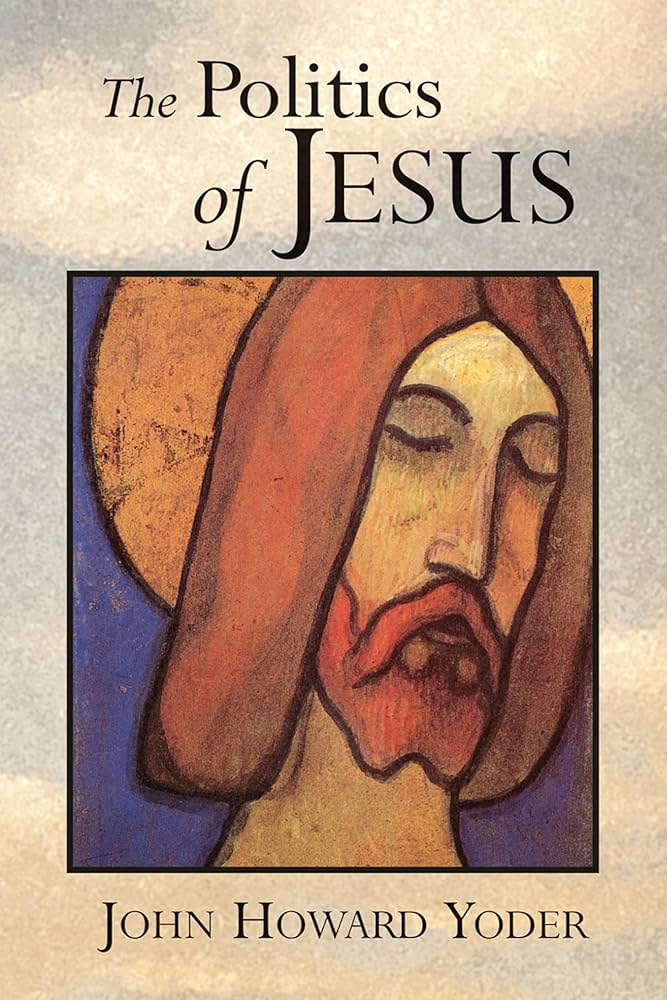John Howard Yoder
SCHOLARSPACIFISTS
* John Howard Yoder systematically engaged in the sexual harassment, abuse, and exploitation of numerous women for decades, exploiting his position of spiritual and academic authority. As with every work on this website, these works are presented for reference purposes only, but we strongly believe the writings of Christian authors should be considered in light of their lives.
John Howard Yoder, a prominent Mennonite theologian, profoundly reshaped contemporary Christian political thought with his book, The Politics of Jesus. His central argument is that the life and teachings of Jesus provide a direct and normative political ethic for Christians, not merely a set of private moral ideals. Yoder rejected the mainstream view that Jesus’s ethics, like turning the other cheek, are impractical for governing society and apply only to personal relationships. Instead, he saw Jesus’s way of life—characterized by nonviolent love, forgiveness of enemies, and voluntary suffering—as a viable and obligatory social strategy for the church.
Yoder’s political theology is fundamentally Christological pacifism. For him, nonviolence is not just a tactic but the core of Christian witness, an imitation of the cross. The cross was not a detour from Jesus's work but the culmination of his political confrontation with the powers of the world. Consequently, Yoder argued against "Constantinianism," the historical merging of church and state power where the church began to justify violence to achieve its ends.
In Yoder’s view, the church itself is the primary social and political witness. It is meant to be a distinct community, a "contrast society" that models a different way of ordering human life based on the radical politics of Jesus. The church's political task is not to rule the world but to be a faithful minority that demonstrates to the world a life free from violence and coercion. This faithfulness to the way of Jesus, Yoder contended, must take precedence over pragmatic concerns about political effectiveness or achieving specific outcomes, trusting that God, not human power, ultimately governs history.
The Politics of Jesus (1972): Yoder's landmark work, arguing that the life and teachings of Jesus, particularly the Sermon on the Mount, provide a direct and normative political ethic for Christians, centered on nonviolent enemy-love.
The Christian Witness to the State (1964): An early and concise articulation of his view that the church's primary political role is to be a faithful witness to the state, rather than trying to control or manage it.
The Priestly Kingdom: Social Ethics as Gospel (1984): A collection of essays that explores the social and political dimensions of the gospel, covering topics from the Constantine shift to the role of the church as a distinct society.
When War Is Unjust: Being Honest in Just-War Thinking (1984): A critical engagement with just-war theory, where Yoder argues for a more rigorous and honest application of its criteria, ultimately reinforcing his pacifist stance.
Body Politics: Five Practices of the Christian Community Before the Watching World (1992): Argues that specific church practices (like baptism, Eucharist, and forgiveness) are inherently political acts that form a community capable of resisting worldly powers.
Discipleship as Political Responsibility (1964): A short, accessible work that frames discipleship not as a private spiritual matter but as a public, political commitment to the way of Jesus.
Nevertheless: The Varieties of Religious Pacifism (1971): A comprehensive study that categorizes and analyzes different forms of pacifism, clarifying his own Christocentric position within that broader tradition.
For the Nations: Essays Evangelical and Public (1997): A collection of later essays that addresses how a pacifist, minority church can still offer a witness for the good of all nations, not just for itself.

